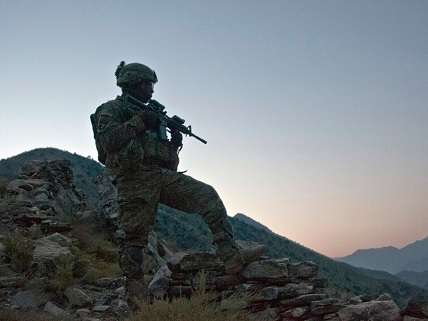ISIS Presence in Afghanistan Shouldn't Complicate U.S. Deployment Decisions

As the Trump administration mulls options on troop deployments to Afghanistan, where the U.S. war is in its 17th calendar year, reports of ISIS expansion in Afghanistan, with attacks across the country and in Pakistan to show for it, may increase pressure to double down on the war effort.
Defense Secretary James Mattis is expected to make a recommendation on troop levels to President Trump soon, and Gen. John Nicholson, the top U.S. commander in Afghanistan, recently told Congress he would like a "few thousand more" troops in the country. There are currently more than 8,000 troops remaining in Afghanistan, where a "drawdown" began back in 2011. The current force was kept there, the Obama administration argued last year, to fight the latest Taliban resurgence. There has been one pretty much every spring since the Afghanistan war began.
Local Afghan officials, who largely rely on U.S. support for their authority and legitimacy (the U.S. has spent more on Afghanistan than it did on the Marshall Plan that rebuilt Europe), meanwhile, are beginning to point to the rise of ISIS as impetus for the U.S. to maintain a presence in their country.
"Certainly if you're a local official who's looking for more resources, by saying that ISIS is in your area, you're going to get more attention," Brigadier General Charles Cleveland, the head US military spokesperson in Kabul, said according to Al-Jazeera, which notes that U.S. officials are far less concerned with the rise of ISIS than local ones. A spokesperson for the Afghanistan president said ISIS was "not only a threat for Afghanistan but for the region and the whole world." A recent attack in Pakistan, where ISIS is not known to have a base of operations, was attributed to the group. Most of its fighters in Afghanistan are from the region.
President Trump has largely ignored the Afghanistan war so far—the war received very little attention from the mainstream press or the mainstream candidates in last year's presidential election, and Trump didn't mention the war at all in his first address to a joint session of Congress. In his 2015 State of the Union, President Obama declared combat operations in Afghanistan over. In 2016, he said the war was coming to an end. Among his last decisions on Afghanistan was to keep troops in the country through 2017.
The presence of ISIS could lead the Trump administration to another troop surge like the one the Obama administration embarked on in 2009 to little effect. Local Islamist groups yearning the validation of U.S. attention to fulfill their deranged apocalyptic visions know, as local government officials do, that an affiliation with ISIS would attract the U.S. Such affiliates from Nigeria to the Philippines ought to be met with skepticism, particularly over operational links, of which there are often none. The U.S. says there are just 700 ISIS fighters in Afghanistan, while local officials place the number at twice that plus thousands more "sympathetic" to the group, surely knowing such larger estimates are more likely to win them more funding and support.
Yet whatever the U.S. has failed to accomplish in 16 years in Afghanistan, it won't accomplish it in its 17th year. The impetus for the war was to destroy a safe haven from which Al-Qaeda could launch another 9/11. Thanks in large part to U.S. foreign policy since 9/11, such safe havens now exist in Yemen, Iraq, Libya, and elsewhere. President George W. Bush warned in an interview this week promoting his latest book, a collection of portraits of military veterans, against the "isolationist tendency" in the U.S. recently. He pointed to the decision to withdraw from the war in Iraq as leading to the rise of ISIS. But ISIS is an off-shoot of Al-Qaeda in Iraq, which did not exist before the Iraq war started. Even granting Bush all his assumptions, a continued U.S. presence in Iraq alone would not prevent the rise of ISIS but rather pull the U.S. into Syria for more preventative measure. And Afghanistan provides a powerful counterexample. Sixteen years of U.S. presence has not eradicated the Taliban—instead, it has arguably provided the Taliban an enemy that keeps them united and sustains their efforts. The U.S. presence could not even guarantee the rise of ISIS. As Al-Jazeera noted, many ISIS fighters are former Taliban and Al-Qaeda, with fighters often switching allegiances based on conditions at the moment. The most stabilizing thing the U.S. could do for Afghanistan is a managed withdrawal that removes a powerful rallying cry for insurgents while forcing Afghanistan and regional powers to work together to ensure their security instead of relying on the U.S. to do so.
